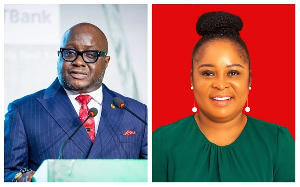President Nana Addo Dankwa Akufo-Addo has tasked the Bank of Ghana (BoG) to interrogate the issue of high interest rate in the country and how the problem could be addressed to enhance the competitiveness of the private sector.
The Monetary Policy Committee (MPC) of the BoG in September, 2019 maintained its key policy rate at 16.00 per cent for the fourth consecutive session after cutting it to a five-year low in January.
The President gave the directive when he addressed business owners at the maiden CEOs Executive Forum held in Accra yesterday.
The initiative is part of government’s comprehensive Public, Private dialogue framework designed to provide a structured and institutionalised mechanism for consultations between government and the private sector.
He said that ongoing reforms in the financial sector coupled with the stabilisation of the micro economy and the implementation of a comprehensive business regulatory reform programme would create the necessary conditions for the private sector to thrive.
He said the achievements chalked so far in stabilizing the financial sector and the economy should serve as the building blocks on the which the private sector to deliver on their mandate for rapid growth and development.
“We believe that a stable macro-economic environment that enables businesses to plan with certainty, invest and thrive is a fundamental pre-requisite to transforming Ghana’s economy, so we can bring progress, prosperity and development to our people, and move our country to a situation beyond aid”.
He noted further that since 2017 when he assumed office, the economy has been growing consistently above 7 percent, and, in the last two years, has been amongst the world’s fastest growing economies, with the IMF projecting Ghana’s economy, this year, to have one of the world’s highest growth rates of 7.6 percent.
“Inflation for September stood at 7.6 percent, in single digits, the lowest in over two decades. Our exports are growing healthily; our trade balance account, for the first time in more than a decade, recorded a surplus in 2017, maintained it in 2018, and we expect to maintain the surplus for this year as well. We have brought the fiscal deficit down to 4.5 percent,” he added.
Furthermore, he said the country’s external reserves, as at June 2019, stood at 4.3 months of import cover with all macroeconomic indices are pointing in the right direction.
“It comes as no surprise, therefore, that, today, Ghana is the leading recipient of foreign direct investment in West Africa.”
Additionally, he noted that, by mid-year 2019, the banking sector had recorded a profit after tax of GH¢1.67 billion, representing year-on-year growth of 36.3 percent, compared with 21.7 percent in the same period last year.
The President said government has since introduced a Business Regulatory Reform Programme, which is a three-year initiative coordinated by the Ministry of Trade and Industry, and implemented in partnership with other stakeholders, aimed at improving the business atmosphere in the country.
He assured the business community in Ghana of his government’s commitment to executing pro-business policies and programmes that would put the private sector at the heart of the country’s industrialisation agenda.
Minister for trade and Industry Alan Kyerematen bemoaned the phenomenon where many African countries have no institutional engagement between the private sector and government to drive the growth agenda.
The CEO forum, he said, would help bridge the gap and create a new dialogue mechanism under the government to create an inclusive participatory engagement with the private sector.
He added that forum would be an all year-round consultative engagement between government and the private sector across the country with an annual Presidential business summit where a business compact would be singed to indicate key performance areas and commitments for both sides.
Click to view details



Business News of Friday, 8 November 2019
Source: thefinderonline.com
Address issue of high interest rates - Akufo-Addo to BoG
Entertainment

CEO of Caveman Watches ties the knot in private ceremony
Opinions














